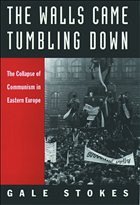Winner of the Wayne S. Vucinich Prize of the American Association for the Advancement of Slavic Studies for the best book published in 1993 in Russian and East European Studies.
To account for the revolutions across Eastern Europe in 1989, Gale Stokes looks back to 1968 and provides an accessible analysis and a monumental history of events to the present day. He analyses the nature of communist power and the varying forms of opposition to it, telling the story of the rise of Solidarity in Poland and of the movements for change among dissident intellectuals across the region. Stokes demonstrates that Eastern Europe is freer today than it has been previously in the twentieth century.
To account for the revolutions across Eastern Europe in 1989, Gale Stokes looks back to 1968 and provides an accessible analysis and a monumental history of events to the present day. He analyses the nature of communist power and the varying forms of opposition to it, telling the story of the rise of Solidarity in Poland and of the movements for change among dissident intellectuals across the region. Stokes demonstrates that Eastern Europe is freer today than it has been previously in the twentieth century.
To account for the revolutions across Eastern Europe in 1989, Gale Stokes looks back to 1968 and provides an accessible analysis and a monumental history of events to the present day. He analyses the nature of communist power and the varying forms of opposition to it, telling the story of the rise of Solidarity in Poland and of the movements for change among dissident intellectuals across the region. Stokes demonstrates that Eastern Europe is freer today than it has been previously in the twentieth century.
To account for the revolutions across Eastern Europe in 1989, Gale Stokes looks back to 1968 and provides an accessible analysis and a monumental history of events to the present day. He analyses the nature of communist power and the varying forms of opposition to it, telling the story of the rise of Solidarity in Poland and of the movements for change among dissident intellectuals across the region. Stokes demonstrates that Eastern Europe is freer today than it has been previously in the twentieth century.

